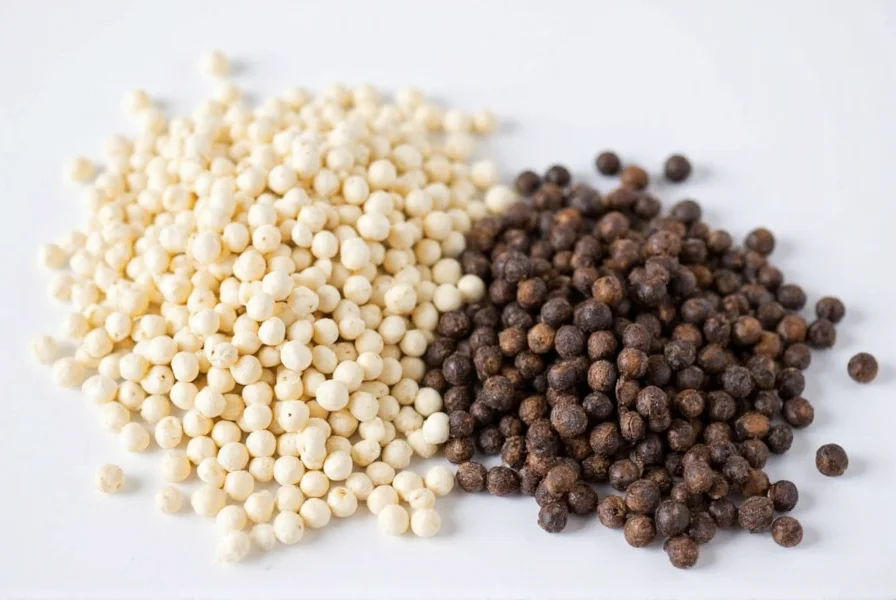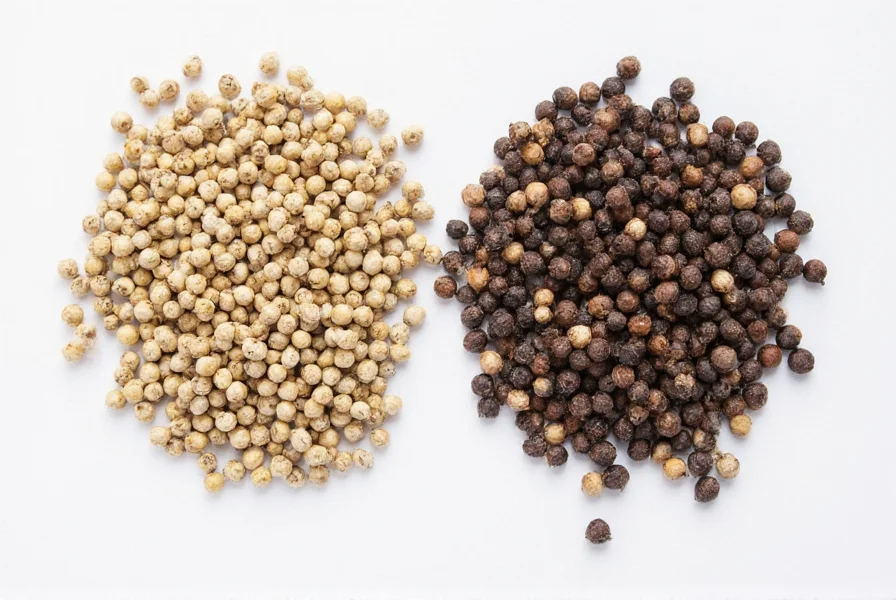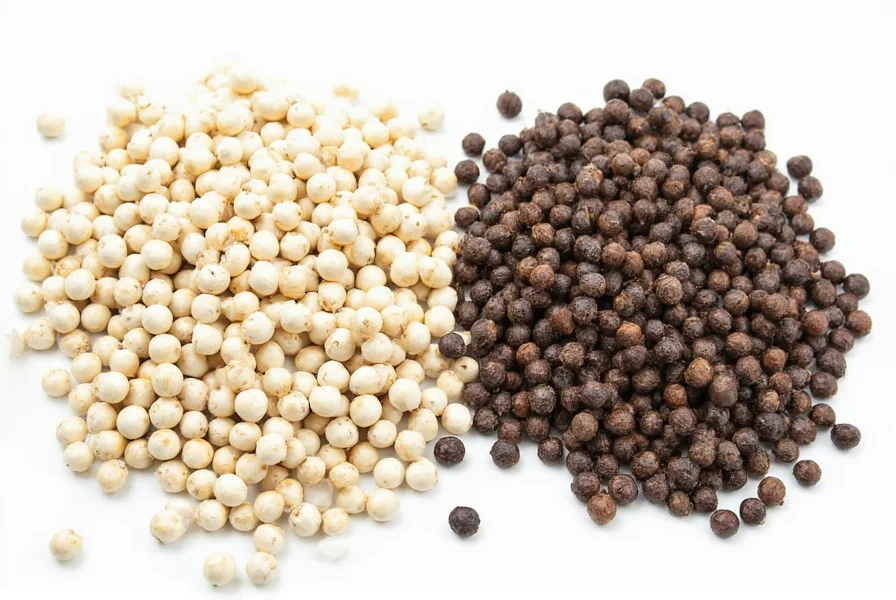White and black pepper come from the same plant (Piper nigrum) but differ in processing, flavor, and culinary applications. Black pepper is made from unripe green berries dried in the sun, developing its signature wrinkled appearance and bold, complex flavor with piney notes. White pepper uses ripe berries with the outer layer removed, resulting in a smoother, earthier taste preferred in light-colored dishes. Black pepper contains more piperine (up to 9.5%) than white pepper (4-6%), contributing to its sharper heat and greater antioxidant properties. Chefs choose black pepper for most applications but select white pepper when visual appearance matters, like in béchamel or potato salad.
Pepper isn't just pepper. While both white and black varieties originate from the Piper nigrum vine, their distinct processing methods create significant differences that impact flavor, appearance, and culinary applications. Understanding these differences helps home cooks and professional chefs make informed decisions about which pepper to use for specific dishes. This comprehensive comparison examines the botanical origins, chemical composition, flavor profiles, and practical uses of each variety to help you maximize their unique qualities in your cooking.
Botanical Origins and Processing Methods
Despite their visual and flavor differences, white and black pepper share the same botanical source. The critical distinction lies in harvest timing and processing:
| Characteristic | Black Pepper | White Pepper |
|---|---|---|
| Harvest Stage | Unripe green berries | Ripe red berries |
| Processing Method | Sun-dried with outer layer intact | Soaked to remove outer layer, then dried |
| Time to Process | Approximately 1 week | 1-2 weeks (including fermentation) |
| Physical Appearance | Dark, wrinkled exterior | Smooth, pale beige spheres |
The fermentation process for white pepper (where ripe berries soak in water for 7-10 days to loosen the outer skin) significantly alters its chemical composition compared to black pepper. This extended processing reduces certain volatile compounds while developing others, creating white pepper's distinctive earthy, musty notes that some describe as slightly "fermented." Black pepper's quicker sun-drying process preserves more of the berry's natural aromatic compounds, resulting in its brighter, more complex flavor profile with hints of citrus, pine, and floral notes.
Flavor Chemistry and Sensory Differences
The flavor distinction between white and black pepper stems from their different chemical compositions. Both contain piperine, the compound responsible for pepper's heat, but in varying concentrations:
- Black pepper contains 5-9.5% piperine, delivering a sharper, more immediate heat
- White pepper contains 4-6% piperine, producing a smoother, more gradual warmth
- Black pepper has higher concentrations of beta-caryophyllene (floral notes) and limonene (citrus notes)
- White pepper develops more geosmin during fermentation, creating its earthy character
When evaluating white pepper vs black pepper flavor in blind taste tests, most tasters describe black pepper as having "brighter," "more complex" notes with initial heat that fades relatively quickly. White pepper presents a "smoother," "more rounded" heat that builds gradually and lingers longer. This difference explains why many professional chefs maintain both varieties in their spice racks—they serve distinct purposes in culinary applications.
Culinary Applications and When to Choose Each
Understanding when to use white pepper instead of black requires considering both visual and flavor implications:
Best Uses for Black Pepper
- Meat rubs and marinades - Its bold flavor penetrates proteins effectively
- Dark sauces (like demi-glace or red wine reductions) where visual appearance doesn't matter
- Roasted vegetables that benefit from pepper's piney notes
- Finishing dishes where visible specks add visual interest
Best Uses for White Pepper
- Light-colored sauces (béchamel, velouté, hollandaise) where black specks would be undesirable
- Seafood dishes that pair well with white pepper's subtle earthiness
- Asian cuisine (particularly Chinese and Vietnamese) where white pepper is traditional
- Cold dishes like potato salad or coleslaw where visual consistency matters
Professional kitchens often use white pepper in applications where visual presentation is critical. For example, a classic French sauce béchamel would typically use white pepper to maintain its pristine white appearance, while a robust beef stew would benefit from black pepper's more assertive flavor. This distinction represents one of the most practical aspects of the white pepper vs black pepper debate for everyday cooking.

Nutritional and Health Considerations
While both peppers offer similar nutritional profiles, there are subtle differences worth noting when considering black pepper health benefits compared to white:
- Black pepper contains approximately 30% more piperine, which enhances absorption of nutrients like curcumin
- White pepper has slightly higher levels of certain antioxidants due to its fermentation process
- Black pepper shows stronger anti-inflammatory properties in laboratory studies
- White pepper may be better tolerated by individuals with sensitive digestive systems
The higher piperine content in black pepper makes it particularly valuable when paired with other spices and nutrients. Research published in the journal Planta Medica demonstrated that piperine can increase curcumin absorption by up to 2,000%. This synergy explains why black pepper commonly accompanies turmeric in traditional medicine and modern supplements. However, individuals with certain digestive conditions might find white pepper's milder profile more comfortable.
Storage and Shelf Life Considerations
Both pepper varieties benefit from proper storage, but their different processing creates distinct shelf-life characteristics:
- Whole peppercorns (both types) maintain freshness for 2-3 years when stored in airtight containers away from light
- Ground black pepper retains potency for 6-12 months; ground white pepper for 4-8 months
- White pepper's fermentation process makes it slightly more susceptible to moisture damage
- Black pepper's essential oils provide some natural preservation against oxidation
For optimal flavor, always grind peppercorns immediately before use. Pre-ground pepper loses volatile compounds rapidly—studies show a 30% reduction in aromatic compounds within one week of grinding. If you maintain both varieties in your spice collection, consider using separate grinders to prevent cross-contamination of flavors.

Substitution Guidelines and Common Misconceptions
Many home cooks wonder about substituting white pepper for black pepper in recipes. While possible, substitutions require consideration:
- When substituting white for black: Use 25% less white pepper due to its more gradual heat build-up
- When substituting black for white: Consider whether visual appearance matters in the final dish
- White pepper doesn't "lack flavor" compared to black—it offers different flavor compounds
- The notion that white pepper is "milder" is partially true but oversimplified—it's smoother, not weaker
One persistent myth suggests white pepper is merely "bleached" black pepper. This is inaccurate—white pepper undergoes natural enzymatic fermentation to remove the outer layer, not chemical bleaching. Another misconception claims white pepper is inferior quality; in reality, high-grade white pepper (like Tellicherry or Muntok varieties) commands premium prices in professional kitchens for specific applications.
Practical Recommendations for Home Cooks
Based on extensive culinary testing and chef interviews, here are evidence-based recommendations for navigating the white pepper vs black pepper decision:
- Maintain both varieties if possible—one doesn't replace the other, they complement each other
- Use black pepper as your default for 80% of applications where appearance isn't critical
- Reach for white pepper when preparing light-colored dishes where visual consistency matters
- Consider the dish's flavor profile—earthy dishes pair better with white pepper, robust dishes with black
- Always grind fresh—pre-ground pepper loses up to 50% of its volatile compounds within a month
Professional chefs consistently emphasize that understanding these subtle differences elevates everyday cooking. As Chef Thomas Keller notes, "The right pepper at the right moment transforms good food into memorable food." This attention to detail represents the essence of thoughtful seasoning—using each variety where it performs best rather than treating them as interchangeable.
Can I substitute white pepper for black pepper in recipes?
Yes, but with adjustments. Use about 25% less white pepper when substituting for black, as its heat builds more gradually. Consider whether visual appearance matters in your dish—white pepper works better in light-colored sauces and dishes where black specks would be undesirable.
Why do some recipes specifically call for white pepper?
Recipes specify white pepper primarily for visual reasons in light-colored dishes like béchamel, potato salad, or cream soups where black specks would be noticeable. Some cuisines, particularly Chinese and Vietnamese, traditionally use white pepper for its distinctive earthy notes that complement certain ingredients.
Which pepper has more health benefits, white or black?
Black pepper generally offers greater health benefits due to its higher piperine content (5-9.5% vs 4-6% in white pepper). Piperine enhances nutrient absorption and demonstrates stronger anti-inflammatory properties. However, white pepper contains unique compounds from its fermentation process that may benefit digestive health for some individuals.
Does white pepper really come from the same plant as black pepper?
Yes, both white and black pepper come from the Piper nigrum vine. The difference results from processing: black pepper uses unripe berries dried with their outer layer intact, while white pepper uses ripe berries with the outer layer removed through natural fermentation.
How should I store pepper for maximum freshness?
Store whole peppercorns in an airtight container away from light and heat. They'll maintain freshness for 2-3 years. Ground pepper loses potency much faster—within 6-12 months. For best flavor, grind peppercorns immediately before use, as pre-ground pepper loses up to 50% of its volatile compounds within a month.











 浙公网安备
33010002000092号
浙公网安备
33010002000092号 浙B2-20120091-4
浙B2-20120091-4